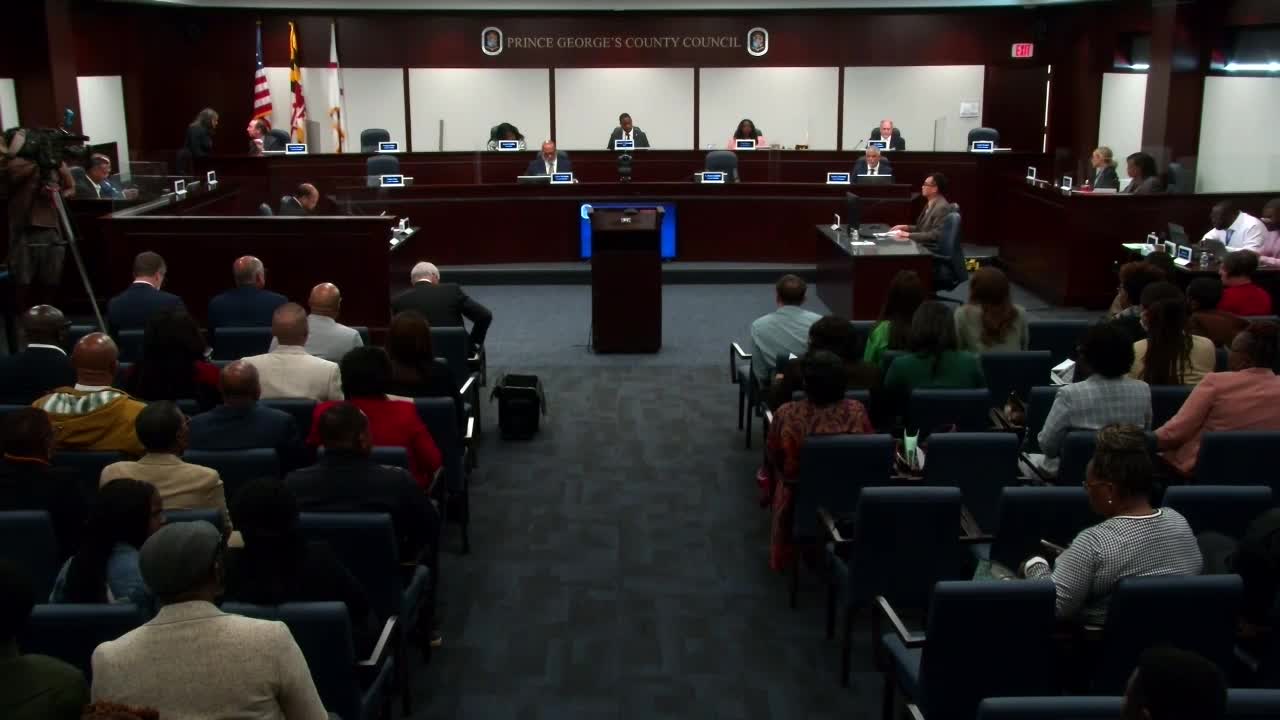Prince George’s County district council remands Signature Club East site plan to planning board
Get AI-powered insights, summaries, and transcripts
Subscribe
Summary
The district council voted unanimously to remand CSP-23002 (Signature Club East), sending the conceptual site plan back to the Prince George’s County Planning Board for rehearing on all exceptions after disputes over tree preservation and traffic analysis.
The Prince George’s County Council, sitting as the District Council, voted unanimously on Oct. 21 to remand conceptual site plan CSP-23002 (Signature Club East) to the Planning Board for further proceedings on all exceptions. The motion for a full remand was made by Councilman Harrison and seconded by Councilmember Watson and passed 9-0.
The remanded plan covers roughly 16.9 acres in Council District 9 at the northeast quadrant of Berry Road and Manning Road East and proposes up to 300 multifamily dwelling units and about 12,600 square feet of commercial and retail space. The Planning Board approved the application by resolution No. 2025-057 on July 31, 2025; the applicant sought remand on discrete procedural and evidentiary issues while opponents asked the district council to decide the exceptions outright.
Emery Huang of the county’s Park and Planning urban design section summarized the application and its regulatory history, noting that the property consists of Lot 12 and Outparcel B, that the site is in Planning Area 84 and in the prior Residential Multifamily 48 (RMF-48) zone, and that the applicant elected review under the prior zoning ordinance because the application was accepted before April 1, 2025. Huang also identified prior approvals affecting portions of the property, including CSP-99050 for Part 3 of the overall project and a 2006 zoning map amendment (A-9960-C) that rezoned Outparcel B to MXT.
Attorney Edward C. Gibbs, representing Signature 2016 Commercial LLC, asked the council to grant a limited remand focused on a narrow set of issues, saying the record lacked detail about prior tree conservation plans and how prior approvals had treated tree preservation. "A remand would serve the interests of all parties here and would allow further discussion," Gibbs said, arguing that earlier Technical Commission/Tree Conservation Plan (TCP) materials and witness testimony left unresolved questions about whether tree preservation areas had been removed in subsequent approvals.
Opposing counsel Alex Votaw, representing the citizen protestants, argued against a remand and asked the council to hear oral argument on the exceptions and then issue a decision. "We strongly oppose a request to remand," Votaw said, adding that at least one issue — whether the application failed to provide adequate traffic facilities — "warrants a reversal on its face." Votaw said remanding only some issues would be inefficient and a poor use of county and community resources because several issues are intertwined.
Stan Brown, attorney for the People’s Counsel (as identified in the record), reviewed the written filings and recommended a full remand. "The case should be remanded for each and every item identified by the opposition," Brown said, noting the council’s role is appellate review and that the record must contain findings of fact and conclusions of law supported by substantial evidence.
Councilman Harrison moved for a full remand so that the Planning Board could revisit every exception and allow broader community participation; he said he wanted the applicant and opponents to "work together with the community to hash out any differences." Councilmember Watson seconded the motion. The clerk then called the roll; the motion carried 9-0.
Under the ordinance cited during the hearing, a remand order requires the Planning Board to conduct an additional hearing and issue a resolution within 60 days of the remand. The council’s action returns the case to the Planning Board for further proceedings on the tree preservation, traffic, and other exceptions raised in written filings and in counsel’s oral arguments.
Next steps: the Planning Board must schedule the additional hearing and produce a written resolution addressing the exceptions identified in the district council record; parties may add persons of record during that remand process, per counsels’ statements at the hearing.
